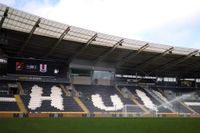Hull City finds itself in a precarious position as the English Football League (EFL) has imposed a transfer embargo on the Championship club, effective from July 4, 2025. This sanction spans three transfer windows, effectively barring Hull from paying transfer fees or loan fees for new players until the January 2027 window. The embargo marks a significant setback for a club eager to rebuild and strengthen its squad after narrowly avoiding relegation in the 2024-25 season.
The root cause of the transfer embargo lies in Hull City's failure to pay a £1 million loan fee owed to Premier League side Aston Villa for the loan of striker Louie Barry during the second half of last season. Despite an agreement earlier in the summer for Hull to sign Barry permanently for £3.5 million, the outstanding debt has shelved those plans indefinitely. Sources reveal that Hull paid the first installment of the Barry loan fee but have yet to settle the remainder, which has raised serious concerns at the EFL.
According to Regulation 52.2.3 of the EFL, "If a Club is in default of payments due to another Club (or club) under a transfer or compensation agreement the Club shall be subject to a registration embargo such that it shall not be permitted to register any Player with that Club without the prior written consent of The League until such time as the agreement is honoured." Hull City now falls under this regulation, joining Yorkshire rivals Sheffield Wednesday as the only two Championship clubs currently under transfer embargoes.
The embargo restricts Hull City's activities in the transfer market to signing only free agents or players whose transfers do not involve fees. This limitation severely hampers the club's ability to bolster its squad and back new head coach Sergej Jakirovic, who was appointed after the dismissal of Ruben Selles following Hull's survival battle last season. Jakirovic, a Bosnian manager with a wealth of experience, now faces the challenge of navigating these restrictions while trying to improve a squad that struggled in the previous campaign.
Hull City's owner, Turkish businessman Acun Ilicali, who acquired the club in January 2022 for around £30 million, has invested heavily to push the club toward Premier League promotion. However, the financial strain is evident. The club's debts have risen to £66 million, and there are growing concerns over cash flow and payment delays. Notably, player wages were paid two days late in May 2025, an issue the club attributed to an administrative error. Furthermore, local and national suppliers have reportedly expressed unease about the club's payment practices, adding to the financial uncertainty.
At a fans' forum held in late June 2025, Ilicali addressed supporters directly, stating, "We don’t have financial problems. It’s true we are spending too much money. Sometimes you can have little technical problems. The club has loans, but those loans are to me. I will not ask for all the loans." Despite this reassurance, the EFL has been in close contact with Hull throughout the summer, demanding funding guarantees to avoid further sanctions. The transfer embargo underscores the league's concerns about the club's financial health and its ability to meet future obligations.
The embargo also limits the size of Hull City's squad to 23 players of "professional standing," a rule designed to prevent clubs under financial scrutiny from hoarding players without the means to pay for them. This restriction adds another layer of complexity for Jakirovic and his coaching staff, which recently welcomed Marko Salatović, Marin Ivančić, and Anđelo Roguljić, all of whom have worked with Jakirovic previously, including at Kayserispor. Club stalwart Andy Dawson has also accepted a new role as head of player development, overseeing the pathway of academy players to the first team, an area that may gain more focus given the transfer limitations.
Hull City's predicament is not unique in the Championship. Sheffield Wednesday, also based in Yorkshire, has been under a similar embargo due to their own financial struggles, including unpaid wages and outstanding debts to HMRC. The EFL's disciplinary measures are part of a broader effort to enforce financial responsibility and sustainability among clubs in the league.
Hull City is actively preparing to appeal the embargo, confident that they can negotiate a reduction in the severity of the sanction. The club has submitted explanations and paperwork to the EFL, hoping to demonstrate a credible plan for settling outstanding debts and managing future payments. However, the embargo remains in place as of July 4, 2025, and the club's ability to sign players involving transfer fees is effectively frozen until January 2027.
This development casts a long shadow over Hull City's ambitions for the upcoming seasons. The club had planned a significant squad overhaul to avoid another relegation scare and to compete more effectively in the Championship. With transfer funds restricted, the focus may shift to nurturing homegrown talent and exploring the free-agent market, strategies that require patience and careful management.
As the 2025-26 season approaches, all eyes will be on Hull City to see how they navigate these financial and sporting challenges. The club's supporters remain hopeful that the embargo can be lifted or softened through appeal and that the team can build a competitive squad under Jakirovic’s guidance. Meanwhile, the EFL continues to monitor the situation closely, prepared to enforce further sanctions if necessary to maintain the integrity and financial health of the league.
In the meantime, Hull City's story serves as a cautionary tale about the delicate balance between ambition and financial prudence in modern football. The coming months will be critical in determining whether the Tigers can stabilize their finances and return to a path of sustainable growth and success on the pitch.

